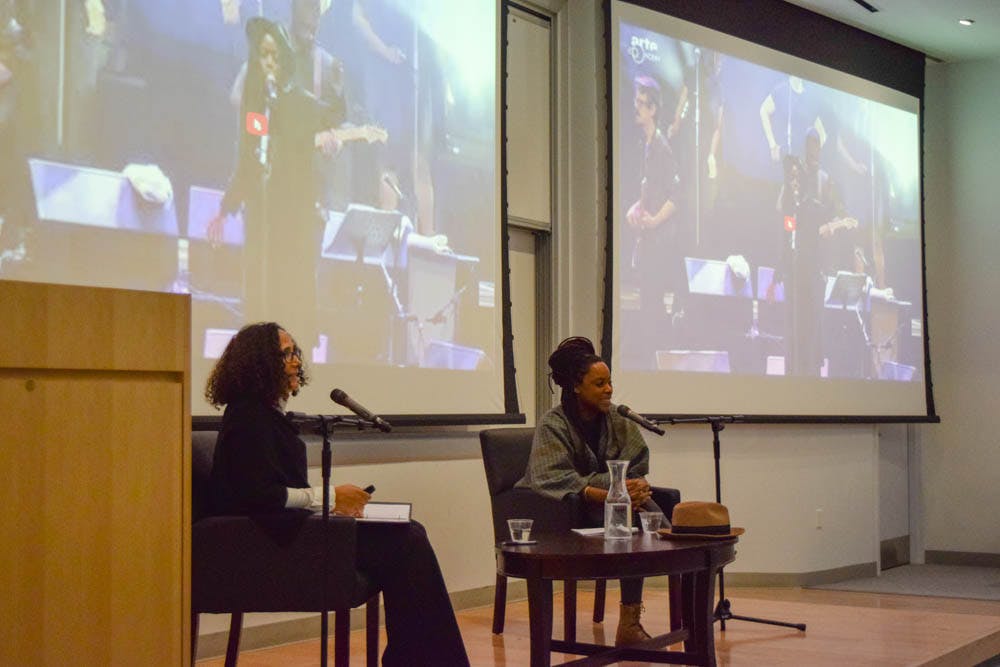When Hip-Hop Artist Akua Naru and Chancellor’s Professor of Africana Studies and Director of the Center for Study of Race and Ethnicity in America Tricia Rose MA ’87 PhD ’93 met for the first time, Naru thought Rose was angry at her. In Naru’s first album, “... the journey aflame,” she illegally used a portion of an online panel Rose spoke on in a song. “She was spitting fire,” Naru said of Rose’s online lecture.
The women discussed the evolution of hip-hop over the past few decades during an event hosted by the Center for the Study of Race and Ethnicity in America and Rose. The conversation was part of the Hip Hop Lecture series, which celebrates the 25th anniversary of the release of Rose’s foundational text “Black Noise: Rap Music and Black Culture in Contemporary America.”
Naru became a fan of Rose’s work after reading the book. She decided to incorporate Rose’s voice into her song, “The Journey,” because it provided a “really good frame” for the story Naru was trying to tell. Though she did not ask for Rose’s permission to use the clip, Rose was grateful Naru did “something useful” with her lecture. Rose discovered Naru had used the clip through Twitter, and tweeted at Naru to ask her to meet. Now, Naru and Rose have formed a friendship based off their shared interest in hip-hop.
For Naru, “hip-hop was a lived practice.” As a child, she loved to read, write and travel. She had no formal musical training, and still doesn’t “know any notes or chords,” Naru said. Her family supported her poetry, and her transition into hip-hop came naturally. “At some point, I (just) couldn’t do anything else,” she added.
Naru is an independent artist and has released four albums so far. Much of her music is inspired by the works she has consumed; one of her songs, “Toni Morrison,” was written to celebrate the author’s influence on Naru’s life, giving Morrison “roses while the world can still smell them.”
“Sometimes I write what I’m looking for,” Naru said of her song, “The World is Listening,” which names many famous female rappers, and celebrates “these women who’ve contributed so much to this global culture.”
Naru and Rose also discussed how many other artists center their songs around negative emotions. “Rage that can be generated” by the suffering of “living in certain bodies can be all consuming” and insidious, Rose said. “It looks like resistance when you’re mad all the time, but you’re just burning yourself up,” she added.
While the experiences of “pain, sadness (and) frustration” are important emotions to feel and reflect on, so too are “joy and laughter,” Naru said. “Suffering is not all of our experience.” Her music explores the full spectrum of the human experience, rather than just “one thing.” Naru credited Rose for challenging her to “think about carving space for joy.”
Rose then turned the conversation toward the “hyper-sexuality of women in hip-hop,” and whether that is a “freedom or a constraint.”
“Sex sells” in the music industry, Naru said, adding that the objectification of female bodies in mainstream hip-hop culture is hard to overcome. Referencing City Girls’ “Twerk” featuring Cardi B music video, Naru said, “you can’t really get more butt naked than butt naked. What is next?” Rather than empowering women, this objectifying culture forces them into a path that is disguised as a choice, she said. The sexualization of women “will never die out.”
Naru hopes “we don’t forget what hip-hop has meant for so many, what it still means and what it can continue to mean.”
In an increasingly digital era, “the entire world is watching,” Naru said.





